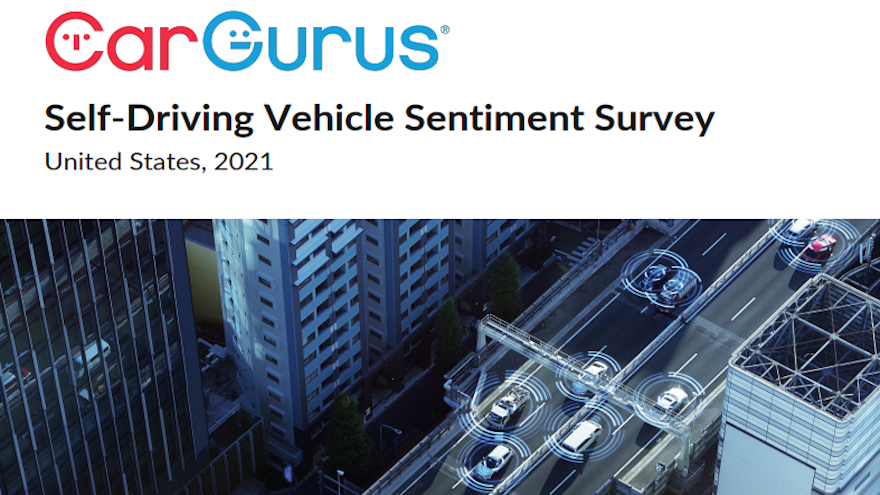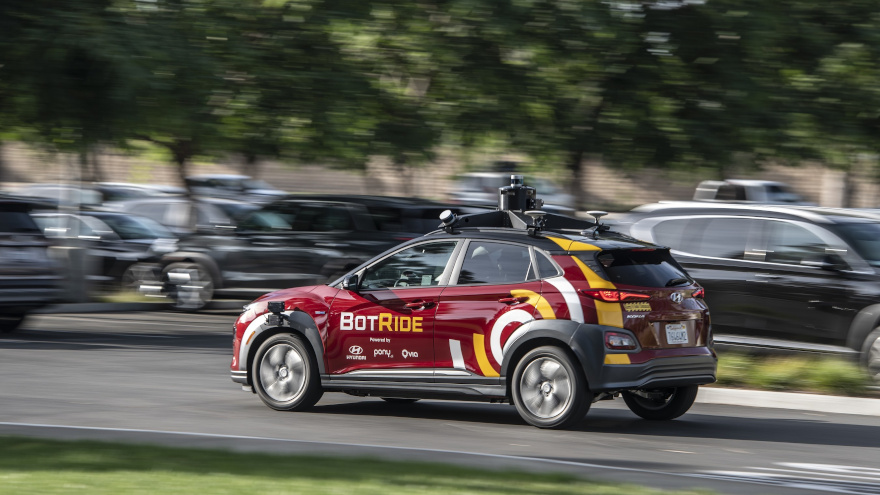CarGurus discovered consumers are becoming more interested in autonomous vehicles (AVs), but the majority still isn’t ready to take its foot off the gas and hands off the wheel completely
On Thursday, site officials released details of the CarGurus Self-Driving Vehicle Sentiment Survey that compiled and analyzed consumer feedback on AV-related topics such as comfort with self-driving, how people imagine utilizing the technology and timeline to adoption.
CarGurus indicated that the study has shown that over the past two years, familiarity with AVs has grown while excitement has remained stagnant.
When asked how comfortable they were with the advancement of self-driving technology, the survey showed 37% of respondents were neutral and 33% expressed excitement. Whereas in 2019, CarGurus indicated 31% of consumers were neutral and 32% excited.
According to the study, it appears that respondents still want to maintain control of a vehicle with 53% of respondents preferring to remain the driver of a self-driving car. Results showed survey participants are least comfortable (20%) sharing the roads with self-driving delivery trucks or fleets, which is a major use case in which the technology is being deployed.
As with electric vehicles, CarGurus reported that respondents chose Tesla (34%) as the most trusted brand to work on self-driving vehicles, followed by Apple (8%) and Toyota (7%).
However, nearly two in 10 respondents do not trust any brand to do so, according to the study, and CarGurus said with 56% wanting brands to bear the responsibility in the case of any accidents, there is a long way to go to earn consumers’ trust
The study also mentioned Tesla is also the top AV brand that shoppers would consider with 54%, followed by Toyota (35%) and BMW (32%).
Despite some apprehension around self-driving vehicles, CarGurus pointed out that consumers still have high hopes for their capabilities.
More than half (56%) of respondents would use AVs to drive them home safely when unable to do so themselves and 42% would want their AV to be able to park itself.
Despite these metrics, CarGurus determined consumers expressed the most interest in advanced driver-assistance systems (ADAS) like back-up cameras (39%) and blind-spot monitoring (56%), features that many cars already have (42% and 17% of drivers respectively report already owning them).
“This year’s Self-Driving Vehicle Sentiment Survey from CarGurus makes clear that autonomous vehicles’ tech offerings need to align with how people want to use them,” CarGurus director of customer insights Madison Gross said in a news release.
“While there is hesitancy around self-driving technology, how consumers envision themselves using the technology would require full autonomy — which is still a goal that the industry is striving toward,” Gross continued. “Until then, shoppers are looking for driving technology that helps them stay in control, rather than technology that takes total control.”
Additionally, the study covered:
• Timeline to adoption, with 34% of consumers saying they will be likely to own an autonomous vehicle in the 10 years.
• Which aspects of autonomous vehicles excite consumers, like being a huge leap in technology (45%), and which concern them, like safety (51%) and cost (45%).
The full results of the study can be found on this website.
Motional, a driverless vehcle technology company, will utilize Cox Automotive Mobility's Pivet program as its fleet service provider — a collaboration the companies say lays the foundation for Motional's path to market for robotaxis in major U.S. cities.
The partnership starts with Motional’s self-driving fleet in Las Vegas.
To allow Motional to work toward serving passengers and entering new markets, Pivet will coordinate daily, weekly and monthly cleaning and disinfection, along with mechanical work of Motional's Las Vegas fleet.
The partnership follows two recent announcements from Motional: One involved the company’s plans to place fully driverless vehicles on public roads.
The second is to significantly grow its fleet and start a multimarket service with Lyft in 2023, in major U.S. cities.
Motional said selecting a partner with a national footprint and on-the-ground support was crucial as it looks to introduce its driverless vehicles to new markets in the near future. Cox Automotive and Motional say they anticipate a long-term collaboration. Motional seeks to use additional Pivet resources as it expands.
“Pivet strives to deliver the most intelligent way to run a modern fleet, while also helping advance transportation technology that will provide safer, more efficient transportation,” Alex Fraser, AVP of Pivet at Cox Automotive Mobility, said in a news release.
Fraser continued, “Motional’s innovation and dynamism in the driverless space partnered with Cox Automotive’s geographic reach and fleet service expertise create a potent force in the industry.”
Motional vice president of go-to-market and marketing Gretchen Effgen said the company in 2020 laid the technical and commercial foundations to bring robotaxis into cities at scale.
“Now, with Pivet, we’re building the critical operational structures,” Effgen said. “This partnership will enable our expansion as we bring driverless technology to more people in more cities.”
Stating it will provide visitors a safe, innovative and eco-friendly transportation alternative, autonomous mobility-as-a-service provider, Beep, will deploy what it says are the first autonomous shuttles at Yellowstone National Park with the National Parks Service.
The pilot deployment program, which will take place in May, will test multi-passenger, electric automated vehicle platforms.
To plan, deploy and operate two autonomous shuttles in the Canyon Village, Beep will work with NPS Park Planning, Facilities and Lands Directorate, the Department of Transportation and Yellowstone National Park. Beep and the NPS will determine exact shuttle stops, route locations and distance.
A Yellowstone National Park press release noted the initiative is part of the Yellowstone Visitor Use Management Program. That program works on testing various pilot projects around the park to enhance the visitor experience.
During the deployment, Beep will provide services for the pilot including the autonomous vehicles, engineering, and mapping of the routes, complete operational, monitoring and management for regular oversight and to support ridership demand.
The program will use 100% electric autonomous shuttles that will have zero emissions. Beep said the deployment aligns with the park’s desire to improve visitor safety, access and experience.
To ensure safe and reliable operation, an onboard shuttle specialist, on-the-ground staff and Beep’s global command center will support and monitor the pilot.
Beep says its safety record is strong, noting it operates what it says is the largest and longest-running U.S. single site AV shuttle fleet, located in Lake Nona, Fla. That is a 17-square-mile planned development in Orlando.
Beep launched in September 2019 and says it has safely transported more than 16,000 passengers in its first year of operation on its initial route. That eliminated the equivalent of nearly 9,400 vehicle trips with carbon emissions that Beep says would have required 170 trees to reverse.
More than seven new routes and programs are now in production, and Beep says the safety and environmental impact is building. Beep says it is the first AV service provider currently participating in NHTSA’s AV TEST Initiative public portal that the U.S. Department of Transportation launched in September.
The company says its processes and procedures onboard align with best practices for ridesharing and transit. Those include frequent cleaning procedures, modified seating capacity, onboard hand sanitizer and disinfectant wipes.
“It’s an honor to be the first in the country to provide autonomous shuttles to the NPS and its visitors,” Beep chief executive officer Joe Moye said in a news release.
Moye continued, “Yellowstone’s Visitor Use Management Program aligns with Beep’s mission to provide alternative, sustainable, and innovative transportation solutions meant to transform and improve mobility for all. This demonstration will help assess how emerging technologies can enhance the visitor experience while making the roads safer and less congested for everyone.”
Through a collaboration between Hyundai, Pony.ai and Via, Irvine, Calif., residents can use an app to hail an autonomous Hyundai KONA Electric SUV directly from their smartphone.
The companies last week unveiled BotRide, which they describe as a shared, on-demand, autonomous vehicle service operating on public roads.
Starting on Monday, a fleet of self-driving KONAs will provide a free ride-sharing service to the Irvine community.
The goal of the pilot program is to study consumer behavior, including that of college students, in an autonomous ride-sharing environment, said Hyundai Motor Co. head of business development, strategy and technology division Christopher Chang.
“We are going to learn about ecosystems, where the vehicles travel and optimize the customer experience,” Chang said in a news release.
He continued, “BotRide is another example of Hyundai's ongoing efforts to actively build expertise in mobility technology as well as the company’s commitment to providing more user-friendly mobility services to customers.”
To build the self-driving system, Hyundai partnered with Pony.ai. To create the BotRide on-demand ridesharing technology and application, the automaker partnered with Via.
Riders can use the BotRide app (iOS and Android) to hail the autonomous ride. Through Via’s advanced algorithms, multiple riders can share the same vehicle, which features Pony.ai autonomous vehicle technology.
Directing passengers to nearby stops for pick up and drop off, the app allows for shared trips without long detours or inconvenient fixed routes and schedules, the companies say.
Through integrated Hyundai and Pony.ai technologies, the BotRide vehicles navigate complex road scenarios safely, according to the companies.
Equipped with Pony.ai’s latest sensor hardware and proprietary software, the companies say the vehicles can identify the exact position of surrounding vehicles, handle pedestrian traffic in urban areas, accurately monitor surroundings, predict other road users’ behavior and plan actions based on those tasks.
BotRide launches with a service area covering several residential, commercial, and institutional points of interest. The companies say that because BotRide’s technology prioritizes passenger-to-system interactions such as automated onboard passenger verification, that helps riders get familiar with technologies that they expect will be common in a future of autonomous mobility.
“Through BotRide, Hyundai is leveraging cutting-edge autonomous vehicle and mobility technologies to introduce a new, safe, and convenient form of transportation to the public,” Hyundai Motor America manager of advanced product strategy Daniel Han said.
He continued, “The BotRide pilot represents an important step in the deployment and eventual commercialization of a growing new mobility business. In addition to the technology partners powering BotRide, the broader city and community ecosystem have also played an important role in making BotRide possible. The BotRide pilot can serve as an example of how cities and companies can come together to truly enable smart cities and smart transportation systems of the future.”
Ninety-six percent of car owners according to a recent report think they will own a car in the future.
However, almost half of them would consider giving up car ownership if autonomous mobility in the form of self-driving buses or taxis was an available option.
The report from Accenture is titled, “Mobility Services: The Customer Perspective,” and it highlights main challenges that car manufacturers face now and in the future when considering the rise in mobility services.
The report studies five areas: brand strength, vehicle ownership, service monetization, city vs. countryside and in-car personalization.
The report notes that vehicle brand is losing its importance. Respondents overall ranked brand as the sixth most important factor for car buying but 10th in the area of car-sharing. They answered that question considering areas such as price, speed, flexibility, comfort, environmental impact, brand and privacy.
“While brand clearly enables some auto manufacturers to charge a premium for their products, the importance of brand will likely fade for the product and shift to the service as the popularity of car-sharing services and autonomous vehicles grows,” Accenture managing director Juergen Reers, who leads its Mobility X.0 practice, said in a news release.
Another key finding of the study is that respondents showed a strong interest for add-on services to autonomous mobility trips. Some of those services include music and video streaming, wellness options such as massage seats, and food and hotel services.
Eighty-nine percent of all respondents — and 97% of those between 18 and 37 years old — expressed interest in those add-on services. The report also measured that question in terms of geography, with respondents in China much more likely to pay for those types of services.
“There is clearly great interest — and therefore significant revenue potential — for add-on services in the future of autonomous mobility,” Reers said. “To get a jump on the competition, car companies should start piloting and refining these services to be ready once autonomous vehicles hit the market.”
Yet another top finding of the study is the untapped potential for autonomous vehicles outside cities. Forty-five percent would be willing to relocate from their current place of residence if they could use autonomous vehicles for their daily commute. Fifty-five percent of respondents in China would be willing to relocate, 42% of European respondents and 37% of U.S. respondents.
Thirty-four percent of all respondents would consider moving to a suburb or rural area when autonomous vehicles become available. The report notes that although most auto manufacturers focus their autonomous driving activities on urban areas, they should expand that focus to suburban and rural areas. Thirty-seven percent of urban premium customers would consider moving to those areas if they could use autonomous vehicles for their daily commutes.
And another finding is that owners of premium-brand cars were more likely than owners of non-premium brands to be willing to give up car ownership for autonomous mobility.
For the survey of 7,000 consumers in the U.S., Europe and China, 85% of respondents were car owners. The study projects revenues from mobility services to reach nearly €1.2 trillion by 2030.
The Automated Vehicle Safety Consortium launched this past April, with a mission to inform and accelerate the development of industry standards for automated vehicles.
The consortium convenes OEM and technology member organizations such as SAE International, Ford, General Motors, Toyota and Uber ATG.
On Thursday, AVSC added to its consortium, announcing Daimler as its latest member.
AVSC said consortium members are collaborating on the development of best safety practices for responsible development and adoption of automated vehicle, or AV, technology ahead of broad deployment.
The consortium said the addition of the Daimler brands deepens the AVSC’s connection in the European market.
Daimler, according to AVSC, is currently incorporating various levels of AV technologies into its brands of passenger vehicles and trucks.
AVSC said Daimler is an advocate of strong testing and safety validation. Daimler, according to AVSC, has used AV technologies in the developing and testing passenger cars and trucks with SAE Level 4 intent ADS technology on public roads.
Consortium members are working on the development of a series of safety principles for SAE Level 4 and 5 automated driving systems.
They are focusing on testing before and during operation of AVs on public roads; data collection, protection and sharing; and interactions between AVs and other road users.
“Like all AVSC members, Daimler brings a longstanding commitment to collaboration to move the entire industry forward,” AVSC executive director Edward Straub said in a news release.
He added, “Daimler and its legacy brands are working to address pre-competitive industry-wide challenges on both sides of the Atlantic; their involvement with the AVSC expands the consortium’s global reach and expertise as we promote safe AV development and testing.”
As a new study from IBM describes it, you’re heading to work in your new vehicle. The vehicle wishes you a happy birthday and shows social media greetings from family and friends.
The vehicle starts driving you to your destination while also checking your health vitals, checking your house to see if you left any appliances on, and downloading your favorite audio book.
That hypothethical scenario above, from a new study from IBM, might have sounded far-fetched a few years ago, but according to the study titled, Automotive 2030: Racing Toward a Digital Future, dramatic change is on the way. The study covers questions such as what actions the auto industry can take to accommodate the change. The report seeks to answer additional questions, such as: How can an automotive organization evolve to operate and innovate like a high-tech company that centers its business around digital and data?
The study also notes that those changes might bring workforce challenges to the auto industry as it begins to build and inhabit digital ecosystems.
With vehicles delivering personalized digital experiences and AI and autonomy becoming standard features, automakers will need important new skills to “remake their workforce from top to bottom,” according to IBM.
IBM said the industry will have to spend more than $33 billion over the next 10 years to bring a direct workforce of more than 8 million people up to digital speed.
How will the industry achieve that? Executives expect a substantial increase in training and reskilling budgets, according to the study.
Fifty percent of surveyed automotive executives say they need to reinvent their organizations with digital technologies, supported by data, in the next 10 years to succeed or even survive, according to the report. Unless the digital experience earns customer loyalty, even the vehicle brand could lose importance in the mobility-as-a-service world, the study states.
Consumers are placing less emphasis on automotive brands and more on access to vehicles and service when and where they need them most, according to the study.
A vehicle’s ability to learn about its occupants, integrate with their devices and have a natural conversation with them will bring greater brand loyalty, surveyed auto executives say. For automakers, according to the report, that presents an opportunity to redefine their brand differentiators by “embracing open digital platforms, changing the way they work and accelerating reskilling efforts.”
“In the next decade, as cars evolve into networked machines dominated by software, the concept of an auto brand may be facing a digital revolution that will require prioritizing in-vehicle digital experiences over driving features to separate from the pack,” IBM global automotive research lead, Institute for Business Value Ben Stanley said in a news release.
Eighty-three percent of executive respondents to the survey say they understand the strategic value of data in their industry. This data can bring operational efficiencies, new business models, or consumer-facing digital experiences such as integration with other personal devices, personalized services and the ability to connect into other aspects of a person's life, according to the study.
However, only 18% of respondents to the survey say they are operating on a digital data platform today.
“Digital reinvention will power the automotive industry towards autonomous, connected, electrified and shared vehicles built on diverse platform ecosystems,” said IBM general manager, global automotive, aerospace & defense industries Dirk Wollschläger. “These ecosystems will be a mixture of technical, agile, high-performance companies from multiple industries, each bringing their own specialization and value to the mix.”
To determine what external influences are impacting the automotive industry today, and how they will change the auto ecosystem in the next 10 years IBM surveyed 1,500 automotive executives globally. The IBM Institute for Business Value developed the Automotive 2030 study, which also surveyed more than 11,500 consumers to better understand what they expect from mobile digital experiences.
The data is in, and it shows that consumers are ready for an autonomous future in terms of vehicles.
But they are not only ready — they are excited about it.
A new study from the Capgemini Research Institute finds that consumer preference for riding in self-driving cars could double within the next 10 years.
Thirty percent of U.S. consumers would prefer to ride in a self-driving car over a traditional vehicle over the next 12 months, according to the survey, and 63% say that by 2029, they will prefer driverless cars as their preferred mode of transport.
The findings, published on May 9 as part of the institute’s "The Autonomous Car: A Consumer Perspective" global report, showed 36% of surveyed U.S. consumers had positive emotions about self-driving cars.
But some barriers remain. Seventy-three percent of respondents say that purchase or adoption of a driverless vehicle is dependent on vehicle security. Seventy-two percent say it is dependent on system security.
Capgemini global head of automotive Markus Winkler said in a news release that auto companies must consider their future customers’ expectations and fears. As they bring autonomous vehicles to market, those companies should focus on “transforming their own operations from a heavy product focus to services and customer orientation,” Winkler said.
But with that caution, it’s hard to ignore the positive signals from consumers. Seventy-three percent of those surveyed foresee benefits with autonomous vehicles in terms of fuel efficiency, 71% foresee benefits from reduced emissions, and 50% see benefits in terms of time savings.
The institute sees even further evidence of optimism and anticipation from consumers because of the finding that 56% say they would be willing to pay up to 20% more for an autonomous vehicle over a standard one.
Consumers believe autonomous cars will take on a larger role in their daily lives, according to the survey. Forty-nine percent of all global respondents would be comfortable with self-driving cars running an errand on their behalf. Fifty-four percent would trust an autonomous vehicle to drop off or pick up non-driving friends and family members. And 50% expect self-driving cars to give them more time for other activities such as socializing, entertainment or working.
The survey provided strong detail about consumers’ views on autonomous vehicles, even considering cultural and geographic factors. Chinese consumers and millennials are two groups showing highly positive sentiment toward autonomous cars.
Capgemini also identified areas of focus that it said could “accelerate the journey towards an autonomous future:
— Keep the customer informed: The consumer's perception of the car as moving from a means of transportation to a quasi-personal assistant places a burden on auto companies, according to Capgemini. Because of that, auto companies should be candid about the capabilities of the vehicle and avoid any risk of misrepresentation.
— Understand and reassure: Auto companies should understand consumer expectations and “bake them into the design process itself,” Capgemini said, and they should also invest in and communicate the safety and security elements of the vehicles.
— Build an ecosystem of services: Automotive companies should expand their scope of consumer offerings. Consumers expect various experiences inside the car, in areas such as entertainment, work and health services.
“Delivering these experiences and to convert them to into business opportunities will require automotive companies to partner with a new set of technology, content and commerce players in order to create an entire ecosystem of services,” Capgemini said.
— Software investment: Automotive companies should integrate autonomous into their overall company strategy across all divisions of their business. They can only achieve that by developing software competencies, Capgemini said.









